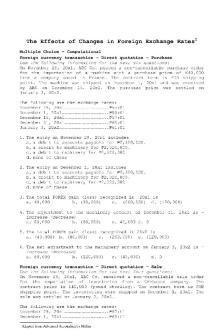Microbiology Literature Review-The effects of Yakult in humans PDF

| Title | Microbiology Literature Review-The effects of Yakult in humans |
|---|---|
| Course | Molecular Biology |
| Institution | Victoria University |
| Pages | 2 |
| File Size | 68.4 KB |
| File Type | |
| Total Downloads | 83 |
| Total Views | 139 |
Summary
Download Microbiology Literature Review-The effects of Yakult in humans PDF
Description
Ashneeta Nand S4555319 RBF2300 MICROBIOLOGY LITERATURE REVIEW The effects of Yakult in humans
ABSTRACT Over the years, probiotic-containing products have been thoroughly researched and explored due to the powerful benefits they provide for humans. They are known to improve digestive health, reduce depression and also promote heart health. A popular probiotic drink known as Yakult was evaluated and studied by various scientists for alternative oral health therapies. This study analyses the research conducted on the importance of probiotic bacteria, specifically focusing on the benefits of Lactobacillus casei strain Shirota in Yakult. REVIEW OF LITERATURE Recent studies have revealed that Lactobacillus casei strain Shirota in Yakult has been shown to have strong antitumor effects in humans through the improvement of the intestinal microflora and modulation of the immune system. According to Takeda and Okumura (2007), Lactobacillus casei strain Shirota in humans has been shown to prevent the recurrence of superficial bladder cancer. Takeda and Okumura studied the effects in consumption of Yakult in nine healthy middle-aged (30– 45yrs) and 10 elderly (55–75yrs) volunteers who had relatively low levels of natural killer cell activity. After one week of consumption of Yakult, the natural killer cell activity significantly increased. These findings suggest that the continuous intake of the fermented milk containing Lactobacillus casei strain Shirota is effective in improving immunity. Another study conducted on the benefits of Yakult consumption also proved that the natural killer cell activity increased which in turn prevented viral infections, including upper respiratory tract infections. During this study 217 healthy males living in Tokyo aged between 30–49 years, all working within office buildings were told to consume one yakult drink a day over a 12 week period. All participants participated in a screening test, in which blood, urine, saliva analysis, a physical examination, and measurements of blood pressure and pulse were recorded. According to the results the natural killer cell activity was significantly higher at week 6 for all participants. This randomized controlled trial clearly demonstrated that the daily intake of Yakult, reduced the risk of upper respiratory tract infections due the presence of that Lactobacillus casei strain Shirota (Shida et al 2015).
Ashneeta Nand S4555319
References Takeda, K & Okumura K, Effects of a Fermented Milk Drink Containing Lactobacillus casei Strain Shirota on the Human NK-Cell Activity, The Journal of Nutrition. Shida, K, Sato, T, Iizuka, R, Hoshi, R, Osamu, W, Tomoki, I, Kouji, M, Masanobu, N & Fumiyasu I, Daily intake of fermented milk with Lactobacillus casei strain Shirota reduces the incidence and duration of upper respiratory tract infections in healthy middle-aged office workers, European Journal of Nutrition....
Similar Free PDFs

Role of Literature in Society
- 1 Pages

Origin-of-Humans
- 4 Pages

Effects of Changes in For Ex Rates
- 40 Pages

Autonomy in Literature
- 21 Pages

PSYCHOANALYSIS IN LITERATURE
- 11 Pages

Pemasaran Yakult di Indonesia
- 6 Pages
Popular Institutions
- Tinajero National High School - Annex
- Politeknik Caltex Riau
- Yokohama City University
- SGT University
- University of Al-Qadisiyah
- Divine Word College of Vigan
- Techniek College Rotterdam
- Universidade de Santiago
- Universiti Teknologi MARA Cawangan Johor Kampus Pasir Gudang
- Poltekkes Kemenkes Yogyakarta
- Baguio City National High School
- Colegio san marcos
- preparatoria uno
- Centro de Bachillerato Tecnológico Industrial y de Servicios No. 107
- Dalian Maritime University
- Quang Trung Secondary School
- Colegio Tecnológico en Informática
- Corporación Regional de Educación Superior
- Grupo CEDVA
- Dar Al Uloom University
- Centro de Estudios Preuniversitarios de la Universidad Nacional de Ingeniería
- 上智大学
- Aakash International School, Nuna Majara
- San Felipe Neri Catholic School
- Kang Chiao International School - New Taipei City
- Misamis Occidental National High School
- Institución Educativa Escuela Normal Juan Ladrilleros
- Kolehiyo ng Pantukan
- Batanes State College
- Instituto Continental
- Sekolah Menengah Kejuruan Kesehatan Kaltara (Tarakan)
- Colegio de La Inmaculada Concepcion - Cebu









